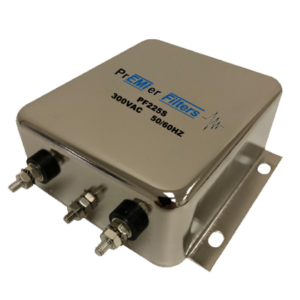COMMERCIAL/INDUSTRIAL SINGLE PHASE EMI POWER LINE FILTERS
Single-phase EMI (Electromagnetic Interference) filters are electrical components used to reduce or eliminate electromagnetic interference generated by electronic devices or systems. EMI filters are crucial in ensuring that electronic equipment complies with electromagnetic compatibility (EMC) standards and regulations, which are designed to prevent interference between different electronic devices and systems.
Premier Filters Commercial/Industrial Single Phase EMI Power Line Filters are specified for voltages to 300VAC and currents to 60A.
Please contact us at +1(657)226-0091 or at info@premieremc.com to discuss your project and filtering needs.
For different termination styles (E.G. QD, Connector, etc.) and Y-Cap values, consult Factory.
Here are some key points about single-phase EMI filters please scroll below the products to continue reading:
COMMERCIAL/INDUSTRIAL
POWER LINE FILTERS
1PH / 0-300VAC
SINGLE STAGE
M5 STUDS / 10nF Y-CAPS
MECH DIM
65x50x40 (MM)
MECH DIM
93x56x45 (MM)
MECH DIM
100x85x38 (MM)
COMMERCIAL/INDUSTRIAL
POWER LINE FILTERS
1PH / 0-300VAC
DUAL STAGE
M5 STUDS / 10nF Y-CAPS
MECH DIM
65x50x40 (MM)
MECH DIM
93x56x45 (MM)
MECH DIM
130x56x53 (MM)
- Purpose: Single-phase EMI filters are primarily used to suppress electromagnetic interference generated by or affecting single-phase electrical systems. They are commonly found in a wide range of applications, including power supplies, inverters, home appliances, and electronic equipment.
- Filtering Mechanism: EMI filters work by providing a path for unwanted electromagnetic noise or interference to be absorbed or attenuated. They typically consist of passive components such as capacitors, inductors, and resistors. These components are arranged in a way that forms a low-pass filter, allowing the passage of power frequencies (e.g., 50Hz or 60Hz AC) while blocking or attenuating higher-frequency EMI signals from 150Khz to 30MHz or from 10Khz to 40 GHz.
- Types of EMI Filters:
- Common Mode Filters: These filters target common mode interference, which occurs when unwanted signals appear in phase on both the line and neutral conductors. Common mode filters are effective at suppressing noise that appears equally on both conductors.
- Differential Mode Filters: These filters address differential mode interference, which occurs when unwanted signals appear out of phase on the line and neutral conductors. Differential mode filters are effective at attenuating noise that appears on one conductor relative to the other.
- Applications: Single-phase EMI filters are commonly used in electronic devices and systems to meet EMC requirements and ensure reliable operation. They are essential in applications where electromagnetic interference can disrupt signal integrity, cause malfunctions, or violate regulatory compliance.
- Design Considerations: When selecting or designing a single-phase EMI filter, factors such as the frequency range of the interference, the permissible insertion loss, and the voltage and current ratings of the filter must be considered. The filter should be chosen or designed to match the specific requirements of the application. Consult Premier Filters Inc for more information at Info@premieremc.com
- Mounting: EMI filters can be integrated into the design of electronic equipment or added externally, depending on the application. They are often mounted close to the power input to effectively filter out unwanted interference.
- Standards and Compliance: EMI filters are subject to various international standards and regulations, such as CISPR (International Special Committee on Radio Interference) and FCC (Federal Communications Commission) standards in the United States. Compliance with these standards is essential for electronic equipment to be legally sold and used.
In summary, single-phase EMI filters are essential components in electronic systems to mitigate electromagnetic interference, ensuring the proper functioning and regulatory compliance of electronic devices and equipment. They come in various configurations and are designed to address different types of interference to provide effective EMI suppression.

